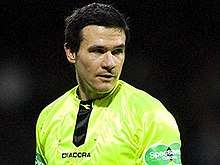Chris Boyle
Christopher (Chris) Boyle (born 11 August 1972 in Glasgow, Scotland) is a Fellow of the British Psychological Society and an Associate Professor in Psychology and Inclusive Education at the University of Exeter.[1] He has previously been an association football Referee who refereed in the Australian A-League[2] and the Scottish Premiership.[3] Dr Boyle is a qualified psychologist working in the UK and in Australia. Dr. Boyle has written extensively on subjects of psychology and inclusive education.[4] He is a respected academic and has authored over 100 publications on these topics.[5]
Christopher (Chris) Boyle | |
|---|---|
 Boyle in 2019 | |
| Born | 11 August 1972 Glasgow, Scotland |
| Nationality | Scottish |
| Other names | Christopher Boyle |
| Citizenship | British - Australian |
| Alma mater | University of Dundee University of Glasgow University of Strathclyde Open University |
| Known for | Educational Psychology Labelling Special & Inclusive Education Beliefs in Santa Claus |
| Scientific career | |
| Fields | Psychology - Education - Special Education |
| Institutions | University of Exeter |
 Chris Boyle - Scottish Premiership | |||
| Full name | Christopher Boyle | ||
|---|---|---|---|
| Born |
11 August 1972 Glasgow, Scotland | ||
| Domestic | |||
| Years | League | Role | |
| 2010-2011; | A-League | Referee | |
| 1999-2009; | SPFL | Referee | |
He successfully edited the Australian Psychological Society's journal The Australian Educational and Developmental Psychologist between 2012 and 2017.
Early life and education
Boyle was born in the 1970s in Dennistoun in Glasgow's notorious east end. Unusual in Scotland at the time but both sides of Boyle's family were from different and non-Scottish background - Irish on his father's side and Italian on his mother's side. He was an avid Queen's Park F.C. fan and played for their supporter's team. Boyle left high school at 16 years old and worked variously as a runner in a stockbroker's office, Youth Training Scheme (YTS) with Glasgow City Council before reappraising his career path and going back to education and completing a Higher National Certificate (HNC) in Computing. This enabled him to gain a place at the University of Glamorgan (now renamed the University of South Wales. He successfully completed a BSc(Hons) in Behavioural Sciences achieving a 2:1. Boyle went on to successfully complete two master's degrees, a BA, a PGCE, and a PhD, the latter from the University of Dundee.
Refereeing career
Boyle has officiated matches in both the Scottish Premier League, Scottish Football League First Division and Scottish Football League Second Division making him one of the most experienced referee's in the A-League. He has also officiated a Scottish Challenge Cup game. He made headlines in his debut match of his A-League career when he officiated the game between Melbourne Victory and North Queensland Fury at AAMI Park. During the game, he awarded three penalties (two to Melbourne, one to North Queensland), and handed out two red cards to North Queensland players Chris Grossman and Eric Akoto.[6]
Academic career
He has also lectured on the professional training programme for educational psychologists at the University of Dundee, UK and in the subject areas of child development and psychology with the Open University, UK. He has completed his PhD at the University of Dundee in the area of inclusion in secondary schools and teacher perceptions of inclusion which both form the main components of his current research interests.[7]
Media Coverage
Boyle's academic work regularly receives media attention[8] and he is often asked to contribute to articles and/or TV/radio programmes around the world.
Published Books
- Inclusive Education: Global Issues and Controversies (with Joanna Anderson, Angela Paige and Sofia Mavropoulou)
- Pathways to Belonging: Contemporary Research in School Belonging (with Kelly Allen)
- Equality in education: Fairness and inclusion (with Hongzhi Zhang and Philip Wing Keung Chan)
- Boyle, C., & Gamble, N. (2014). Ethical practice in applied psychology. Melbourne: Oxford University Press.
- Boyle, C. (Ed.) (2013). Student Learning: Improving Practice. New York: Nova Publishers.
- Boyle, C., & Topping, K. (Eds.) (2012). What works in inclusion? London: Open University Press.
References
- http://socialsciences.exeter.ac.uk/education/staff/profile/index.php?web_id=christopher_boyle
- http://www.ultimatealeague.com/referee_detail.php?referee_id=28
- https://www.soccerbase.com/referees/referee.sd?referee_id=888
- https://orcid.org/0000-0001-6196-7619
- https://www.researchgate.net/profile/Christopher_Boyle
- "Nine-man Fury claim point". A-League. 22 August 2010. Archived from the original on 25 February 2011. Retrieved 23 August 2010.
- https://www.researchgate.net/profile/Christopher_Boyle
- https://www.bbc.co.uk/news/education-52641757
External links
- Ultimate A-League profile
- ResearchGate
- Orcid